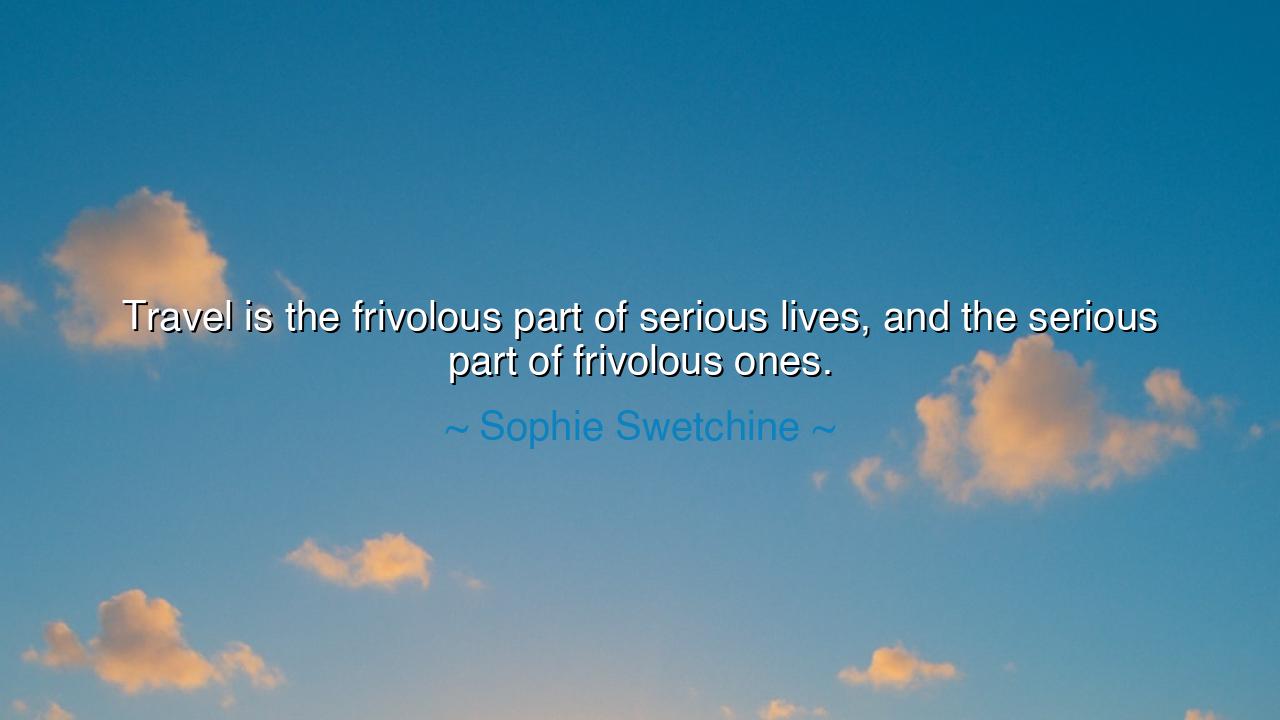
Travel is the frivolous part of serious lives, and the serious






The French mystic and moralist Sophie Swetchine once wrote with elegance and paradox: “Travel is the frivolous part of serious lives, and the serious part of frivolous ones.” Though her words are simple, they hold a mirror to the human condition, revealing the double face of travel—sometimes light and playful, sometimes weighty and transformative. She shows us that journeys are not the same for every soul: to the one who labors heavily, travel is a moment of respite; to the one who plays too lightly, travel becomes a rare encounter with depth.
When she speaks of travel as the “frivolous part of serious lives,” she means that for those who live with grave responsibilities—leaders, workers, parents, thinkers—travel is a momentary escape, a playful interlude in the symphony of duty. To step away from one’s burden is not to abandon it, but to breathe, to rest, to see life from a new vantage. For the serious man, the voyage is not the center of life, but a brief and healing ornament to it. His heart remains rooted in the weight of his calling, and thus travel becomes like the laughter of a solemn friend: light, refreshing, but never the essence.
Yet, in the second breath, she declares travel to be the “serious part of frivolous lives.” Here she reveals its opposite face. For the one who drifts without aim, chasing pleasures and wasting days, travel can strike with unexpected gravity. The ruins of Rome, the deserts of Egypt, the voices of distant peoples—all these confront the wanderer with truths greater than his idle pursuits. What seemed at first another amusement becomes a revelation, pressing seriousness upon the heart of the careless. In this way, travel becomes the stern teacher of those who had none, the anchor for the frivolous soul.
History provides examples of both. For Marcus Aurelius, emperor and philosopher, travel across the empire’s battlefronts was the frivolous part of his serious life. He bore the weight of Rome on his shoulders, and yet his journals—The Meditations—show that amidst campaigns and journeys, he found moments of calm reflection, treating travel as a breath of air amid storms of responsibility. On the other hand, Lord Byron, who lived a life of play, passion, and scandal, found in his journeys across Greece and the East not merely pleasure, but his deepest purpose. Travel, for him, became serious: he fought for Greek independence and gave his life in a foreign land.
The origin of Swetchine’s insight lies in her own life. Born into nobility, raised among the weight of court and society, she knew the solemnity of responsibility. Yet as an exile from Russia, living in Paris, she also saw how others treated life as theater and play. In observing both, she discerned the dual nature of travel: a fleeting indulgence to the weighty, and a sobering encounter to the careless. Her words are not condemnation, but balance—reminding us that travel reveals not itself, but who we are when we set out upon the road.
The lesson for us is clear: do not mistake travel as the goal, nor dismiss it as nothing. See it as a mirror of your own soul. If your life is heavy with duty, let travel be a joy, a rest, a touch of color—but do not seek in it escape from the noble work that defines you. If your life is too light, wasted on trifles, let travel awaken you—let it show you ruins that speak of mortality, temples that speak of eternity, and faces that speak of shared humanity. Let it give you depth, as fire tempers metal.
Practical actions follow easily. Travel not merely for escape, nor merely for boasting, but with intention. Ask yourself: What do I seek from this road? If you need rest, let the journey restore you. If you need awakening, let it challenge you. Walk through foreign streets with eyes open, not only to sights but to lessons. And when you return, do not leave the journey behind; let it shape your soul, your choices, your vision of the world.
Thus, the wisdom of Sophie Swetchine endures: “Travel is the frivolous part of serious lives, and the serious part of frivolous ones.” To future generations, let it be remembered: the road is not only made of stone and dust, but of mirrors. Each step reveals who you are, whether you bear duty heavily or squander time lightly. And in every case, travel holds the power to balance, to heal, and to transform.






AAdministratorAdministrator
Welcome, honored guests. Please leave a comment, we will respond soon